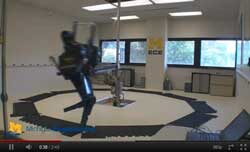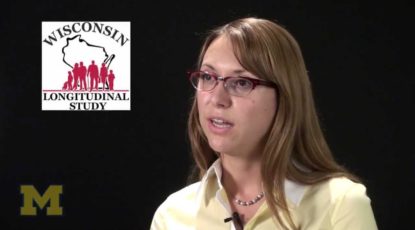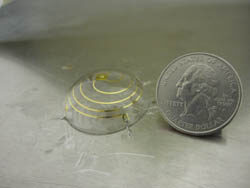Research News
-
Michigan, the moon, and beyond
From even before the all-Wolverine crew of Apollo 15, the U-M College of Engineering has played a key role in American space flight.
-
Ancient whale skulls and directional hearing: A twisted tale
Skewed skulls may have helped early whales discriminate the direction of sounds in water and are not solely, as previously thought, a later adaptation related to echolocation.
-
Looking for life on Mars
“On Earth, everywhere there’s liquid water, there is microbial life,” says U-M professor Nilton Renno. He’s the scientist who discovered liquid water droplets on Mars, and he’s now leading a project to explore pockets of very salty, liquid water on the red planet. It might be the best bet for finding microbial life beyond Earth.
-
Run, Robot! MABEL is now the world's fastest two-legged robot with knees
A robot in a University of Michigan lab can run like a human—a feat that represents the height of agility and efficiency for a two-legged machine. “It’s stunning,” says professor Jessy Grizzle. “I have never seen a machine doing a motion like this.”
-
Motives matter: Why we volunteer has an impact on our health
People who give, live longer, studies have shown. Now, a new study shows that why people volunteer—not whether they volunteer—is what really counts.
-
Actually, it doesn't take a village
“In the African villages that I study in Mali, children fare as well in nuclear families as they do in extended families,” says U-M professor Beverly Strassmann.
-
Listening to the Dow
U-M librarian Justin Joque’s “sonification” of stock market activity since the 1930s provides weird and revealing insight into the economy.
-
Teeny-tiny antennas
U-M researchers have found a way to mass-produce antennas so small that they approach the fundamental minimum size limit for their bandwidth, or data rate, of operation. It could lead to new generations of wireless consumer electronics and mobile devices.
-
The universe may have been born spinning
Physicists and astronomers have long believed that the universe has mirror symmetry, like a basketball. But recent findings from the University of Michigan suggest that the shape of the Big Bang might be more complicated than previously thought, and that the early universe spun on an axis.









